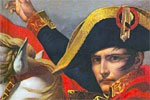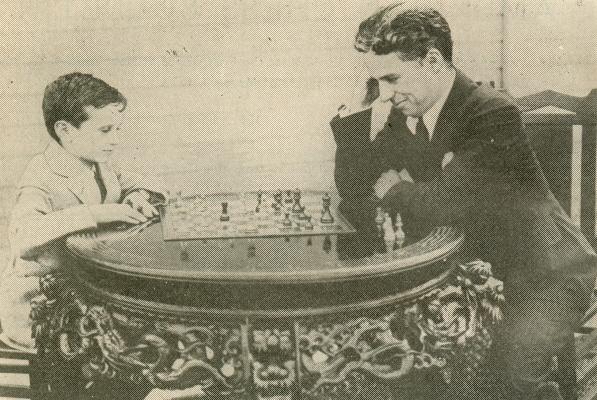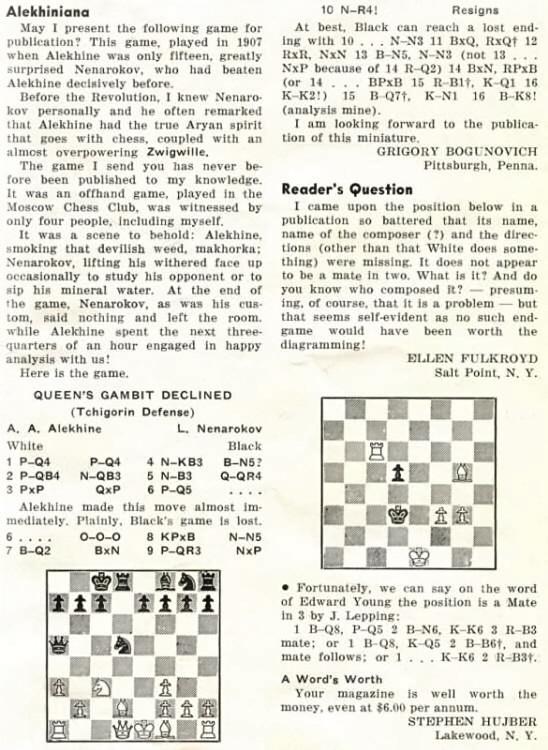


In the chess world the hoaxer has a relatively easy time, scrutiny being low and gullibility high. Anyone who untruthfully ascribes a game-score to a famous player (or, better still, to a non-chess personage) has a fair chance of the pretence being propagated and, even, believed. The lack of a proper source is scarcely a handicap, given that much of the ‘information’ which swirls around the chess world does so sourcelessly.
Since the nineteenth century, games have been misattributed to Jean-Jacques Rousseau and to Napoleon Bonaparte and they continue to appear in print no matter how often they are shown to be spurious. The example below is from a children’s book, Chess by Jean Pickles (Loughborough, 1980):


The Romanian book mentioned in the above Chaplin link also had games ascribed to Karl Marx and Albert Einstein. The latter’s alleged over-the-board encounter with Oppenheimer was discussed in a Chess Mysteries article of ours, while another article in the series gave a game attributed to Stalin. And, of course, there is the Hitler v Lenin affair (without any game-score so far).
One game for which no case can be made is the miniature Alekhine v Nenarokov, given on the letters page of Chess Review, September 1959, page 257:

We pointed out in C.N. 1537 that the following had been published shortly beforehand, on page 169 of the June 1959 BCM:

It took longer to unravel the truth about the queen’s rook odds brevity labelled Capablanca v Hagenlocher (or Hagenlacher) and supposedly won by the Cuban at Monte Carlo in 1922: 1 e4 e5 2 Nc3 Bc5 3 f4 exf4 4 d4 Bb4 5 Bxf4 Bxc3+ 6 bxc3 d5 7 e5 Be6 8 Bd3 Ne7 9 Bg5 h6 10 Bh4 O-O 11 Qh5 c6 12 Nf3 Qd7 13 h3 Nf5 14 g4 g615 gxf5 gxh5 16 Rg1+ Kh8 17 Bf6+ Kh7 18 fxe6 mate. It was eventually shown by a C.N. correspondent, the late Jack O’Keefe (Ann Arbor, MI, USA), that the game had been won by L. Hoffer and published on page 276 of the Chess Monthly, May 1880, i.e. over eight years before Capablanca was born.

Other C.N. items (3696, 3701, 3705, 3721, 3735 and 5975) have examined a game ascribed to Pope Leo XIII. With regard to Pope John Paul II, see an item in Chess Jottings. A notable curiosity is a 1946 game purportedly played by the future Pope against Wanda Zartobliwy, given that ‘Zartobliwy’ is the Polish word for ‘facetious’ or ‘jocose’. Our article also mentioned that in the 1980s Jean-Marie Morisset of Rouen invented games by a number of celebrities.
Of course, hoaxes may relate not to games or compositions but to incidents. A spectacularly improbable story concerned a blindfold chess expert, Richard Rooke Rookewarden. The pattern of molecules in one portion of his brain resembled the squares of a chessboard, or so it was supposedly discovered after he died. In reality, of course, Rookewarden had never lived.
Submit information or suggestions on chess explorations
All ChessBase articles by Edward Winter
 Edward
Winter is the editor of Chess
Notes, which was founded in January 1982 as "a forum for aficionados
to discuss all matters relating to the Royal Pastime". Since then, over 6,680
items have been published, and the series has resulted in four books by Winter:
Chess
Explorations (1996), Kings,
Commoners and Knaves (1999), A
Chess Omnibus (2003) and Chess
Facts and Fables (2006). He is also the author of a monograph
on Capablanca (1989).
Edward
Winter is the editor of Chess
Notes, which was founded in January 1982 as "a forum for aficionados
to discuss all matters relating to the Royal Pastime". Since then, over 6,680
items have been published, and the series has resulted in four books by Winter:
Chess
Explorations (1996), Kings,
Commoners and Knaves (1999), A
Chess Omnibus (2003) and Chess
Facts and Fables (2006). He is also the author of a monograph
on Capablanca (1989).
Chess Notes is well known for its historical research, and anyone browsing in its archives will find a wealth of unknown games, accounts of historical mysteries, quotes and quips, and other material of every kind imaginable. Correspondents from around the world contribute items, and they include not only "ordinary readers" but also some eminent historians – and, indeed, some eminent masters. Chess Notes is located at the Chess History Center. Signed copies of Edward Winter's publications are currently available.